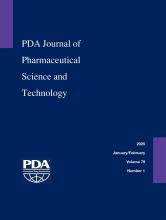Abstract
Appropriate performance of virus validation studies and testing of unprocessed bulk harvests for retrovirus particle count are procedures in the demonstration of an acceptable level of viral safety for cell-derived biotechnology products. Product-specific validation studies on virus reduction with two model viruses (usually MuLV and a parvovirus) performed in duplicate runs is standard for clinical trial applications. For the retroviral safety margin normally a 6 log reduction is expected. Retroviral particle counts are measured traditionally by transmission electron microscopy (TEM) and are commonly performed at contract laboratories. These procedures are quite time consuming and can be associated with significant costs. In particular the time factor is a hurdle for companies to bring their new products fast to the clinic. In this session, several strategies were presented how to lower time, costs and work load in the evaluation of viral safety for early clinical trial applications while still ensuring sufficient level of viral safety of the product. In addition, virus reduction strategies for molecules which do not have the standard antibody structure are presented. The feasibility of the use of retrovirus-like particle (RVLP) in pre-validation of virus removal is investigated and the use of quantitative polymerase chain reaction (qPCR) as alternative to infectivity assays in virus validation studies as well as its use as alternative to quantitative TEM analysis for determining RVLP count in the bulk harvest of a perfusion bioreactor is presented in this session.
- Novel format molecules
- Project acceleration
- Quantitative polymerase chain reaction
- Retrovirus-like particles
- Safety margin
- Viral Clearance
- Received June 21, 2018.
- Accepted June 28, 2018.
- Copyright © 2018, Parenteral Drug Association
PDA members receive access to all articles published in the current year and previous volume year. Institutional subscribers received access to all content. Log in below to receive access to this article if you are either of these.
If you are neither or you are a PDA member trying to access an article outside of your membership license, then you must purchase access to this article (below). If you do not have a username or password for JPST, you will be required to create an account prior to purchasing.
Full issue PDFs are for PDA members only.
Note to pda.org users
The PDA and PDA bookstore websites (www.pda.org and www.pda.org/bookstore) are separate websites from the PDA JPST website. When you first join PDA, your initial UserID and Password are sent to HighWirePress to create your PDA JPST account. Subsequent UserrID and Password changes required at the PDA websites will not pass on to PDA JPST and vice versa. If you forget your PDA JPST UserID and/or Password, you can request help to retrieve UserID and reset Password below.






